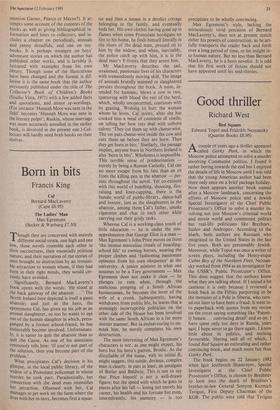Born in bits
Francis King
Cal
Though they are concerned with entirely different social strata, one high and one low, these novels resemble each other in their succinctness, their essentially political nature, and their narration of the stories of men brought to destruction by an irresisti- ble attraction to women whom, if they had been in their right minds, they would cer- tainly have avoided.
Significantly, Bernard MacLaverty's book opens with the words: 'He stood at the back gateway of the abattoir ...' The North Ireland here depicted is itself a giant abattoir; and just as the hero, the eponymous Cal, has given up his job as an animal slaughterer, so too he wants to opt out of the human slaughter in which, press- ganged by a former school-friend, he has ineluctably become involved. Unfortunate- IY, it is easier to quit the abattoir than to quit the Cause. As one of his associates ominously tells him: 'If you're not part of the solution, then you become part of the problem.'
What precipitates Cal's decision is his glimpse, in the local public library, of the widow of a Protestant policeman in whose Murder he took part. Paradoxically, her connection with the dead man intensifies her attraction. Obsessed with her, Cal Manages to get work on the farm where she lives with her in-laws, becomes first a squat- ter and then a tenant in a derelict cottage belonging to the family, and eventually beds her. His own clothes having gone up in flames when some Protestant hooligans set fire to his home, he finds himself literally in the shoes of the dead man, pressed on to him by the widow; and when, inevitably, the police catch up with him, it is in the dead man's Y-fronts that they arrest him.
Mr MacLaverty describes the sad, straitened, passionate lives of his characters with tremendously moving skill. The image of animals brutally maimed or slaughtered persists throughout the book. A mine, in- tended for humans, blows a cow in two, spattering with blood the rest of the herd, which, wholly unconcerned, continues with its grazing. Wishing to hurt the woman whom he loves, Cal insists, after she has cooked him a meal of costelette di vitello, on telling her how vets deal with unborn calves: 'They cut them up with cheese-wire. The vet puts cheese-wire inside the cow and cuts them up before they are born. Then they get born in bits.' Similarly, the passage implies, anyone born in Northern Ireland is also 'born in bits'. Wholeness is impossible. This terrible sense of predestination merely by being a Roman Catholic, Cal can no more escape from his fate than an ox from the killing pen in the abattoir — per- sists throughout the novel. Yet co-existent with this world of bombing, shooting, fire- raising and knee-capping, there is the banale world of public-library, dance-hall and boozer, just as the slaughterers in the abattoir, among them Cal's father, smoke cigarettes and chat to each other while carrying out their grisly tasks.
Whereas Cal is a working-class youth of little education — he is under the mis- apprehension that George Eliot is a man Max Egremont's John Price moves on from `the intense masculine rituals of boarding- school life' to owning horses, wearing the proper clothes and 'fashioning passionate opinions from his own eloquence' at the university. A junior minister in what one assumes to be a Tory government — Max Egremont does not make it clear — he plunges to ruin when, through the malicious pimping of a South African businessman, he becomes the lover of the wife of a crook. Subsequently, having withdrawn from public life, he learns that a seemingly incorruptible politician on the other side of the House has been involved with the same South African in a far more sinister manner. But in endeavouring to un- mask him, he, merely completes his own destruction.
The most interesting of Max Egremont's characters is not, as one might expect, his hero but his hero's patron, Brodie. As the dissyllable of the name, with its initial B, might suggest, this subtle, devious, complex man is clearly, in part at least, an amalgam of Butler and Baldwin. This is not to say that Price himself is not a well-drawn figure; but the speed with which he goes to pieces after his fall — losing not merely his career, his health and his fortune but even, intermittently, his memory — is too precipitate to be wholly convincing.
Max Egremont's style, lacking the miraculously vivid precision of Bernard MacLaverty's, does not at present match either his powers of construction, as he art- fully transports the reader back and forth over a long period of time, or his insight in- to human nature. But no less than Bernard MacLaverty, he is a born novelist. It is odd that his first work of fiction should not have appeared until his mid-thirties.






































 Previous page
Previous page